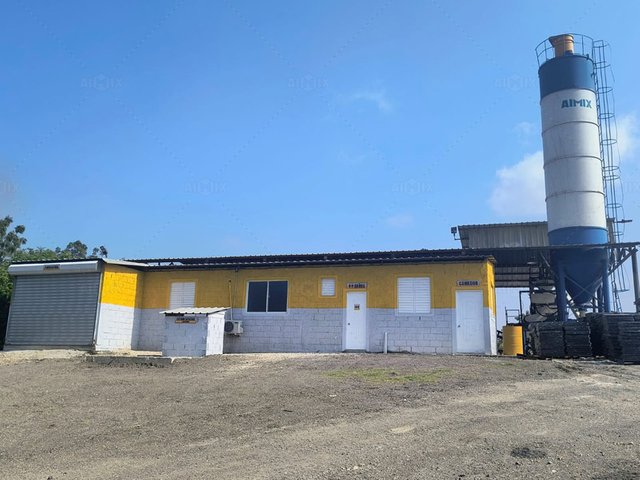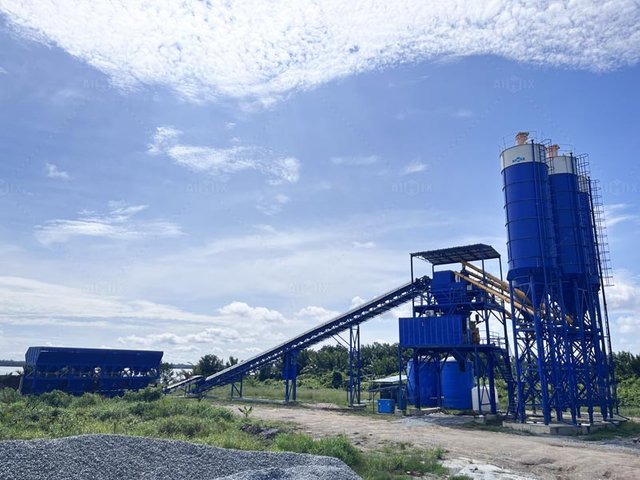When choosing a concrete plant for a construction project, one of the most important factors to consider is the cost of installation. Both fixed and mobile concrete plants offer distinct advantages, but the initial investment, maintenance, and operational costs can vary significantly. In this article, we will compare the costs associated with installing a fixed concrete plant and a mobile concrete plant, highlighting key considerations for businesses in the construction industry.
Understanding Concrete Plants
Concrete plants are crucial for producing large quantities of concrete for various construction projects, ranging from residential buildings to major infrastructure works. Depending on the project’s scale, contractors may choose between a fixed concrete plant and a mobile concrete plant. The fixed concrete plant is typically stationary, designed for long-term use, while the mobile plant offers greater flexibility and portability, suitable for projects that require mobility and temporary setups.
Before diving into the cost differences, it's important to understand the factors that influence the installation costs of each type of plant. These include the plant’s capacity, location, transportation costs, installation time, and the required infrastructure.

Initial Installation Costs
The initial installation cost of a concrete plant(planta de concreto precio) includes both the price of the equipment and the expenses related to site preparation, transport, and assembly.
Fixed Concrete Plant Installation Costs
A fixed concrete plant, also known as a stationary plant, is a permanent installation designed for long-term use. The setup process for a stationary concrete plant requires significant site preparation, including leveling the ground, installing power supplies, and building the necessary infrastructure to support the plant. Because it’s a large, heavy system, transportation costs can also be high, especially if the plant is being transported over long distances.
In addition to the equipment costs, businesses need to factor in labor costs for the installation and commissioning of the plant. The time required for setting up a fixed plant is typically longer than for a mobile plant, as it involves more complex procedures.
Generally, the cost of a fixed concrete plant is higher than a mobile plant due to its larger size, higher capacity, and the need for significant site preparation and infrastructure.
Mobile Concrete Plant Installation Costs
On the other hand, the installation cost of a mobile concrete plant is significantly lower. Mobile plants are designed for quick setup and can be transported from one location to another with ease. Since they do not require permanent foundations or extensive site preparation, the costs associated with installation are much lower. The mobility of these plants also eliminates the need for expensive infrastructure like large-scale power connections or water supply systems.
However, the overall concrete plant price for a mobile plant will still depend on the plant’s capacity and the features it offers. Even though mobile plants are cheaper to install, they may still come with significant costs, especially if they need to be customized for specific project requirements.
Operational and Maintenance Costs
Once the concrete plant is installed, ongoing operational and maintenance costs need to be considered. These costs are directly tied to the plant’s usage, efficiency, and the type of ready-mix plant(planta de concreto premezclado) in question.
Fixed Concrete Plant Operational Costs
For fixed concrete plants, operational costs tend to be higher due to their large capacity and the extensive infrastructure needed for their operation. A fixed plant generally operates at higher volumes and serves as the primary source of concrete for large-scale construction projects. The electricity and fuel consumption of a fixed plant can also be substantial, as it runs continuously to meet demand.
Maintenance costs for a fixed plant can be more expensive as well, as the equipment is larger, and any downtime can significantly impact project timelines. Additionally, a fixed plant requires regular inspections, repairs, and replacement of worn-out parts, which can add to long-term maintenance costs.
Mobile Concrete Plant Operational Costs
Mobile concrete plants are often more energy-efficient and cost-effective to operate. Since they have a smaller capacity and produce concrete in smaller batches, the fuel and electricity consumption is typically lower. These plants are more efficient for temporary, on-demand production, which makes them suitable for smaller projects or when concrete needs to be produced in multiple locations.
Maintenance costs for mobile plants are generally lower as well, primarily because the plant is designed to be easy to disassemble and reassemble. Regular maintenance tasks are less labor-intensive, and many parts are modular, making repairs more affordable.

Long-Term Considerations
When evaluating the cost of installation, businesses must also consider the long-term benefits of each type of plant. While a fixed plant may involve higher initial and operational costs, it can offer greater reliability and efficiency for large-scale projects. It is better suited for companies that have a continuous need for concrete production.
In contrast, a mobile concrete plant can be a better option for contractors who need flexibility and may be working on multiple smaller projects in different locations. The reduced initial investment, coupled with lower operational costs, makes mobile plants an attractive option for businesses with fluctuating concrete demands.
Conclusion
In conclusion, the cost of installing a fixed concrete plant versus a mobile concrete plant depends on a variety of factors, including the size of the project, the expected volume of concrete production, and the duration of the project. While fixed plants are more expensive to install and maintain, they are ideal for large-scale, long-term construction projects. Mobile plants, on the other hand, offer a cost-effective solution for smaller, temporary projects that require mobility and flexibility.
Ultimately, the decision on whether to invest in a fixed or mobile concrete plant should be based on the specific needs of the construction project, as well as the available budget. Whether it's a ready-mix concrete plant or a large-scale fixed installation, choosing the right concrete plant can significantly impact the overall success and efficiency of a construction project.